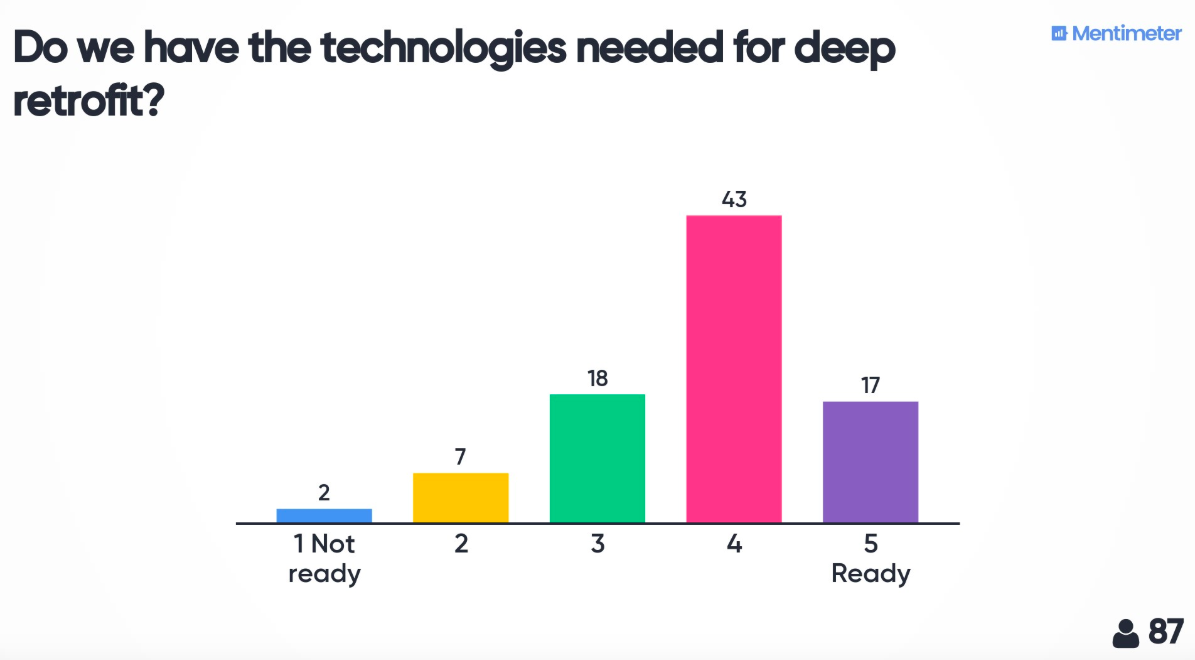Leeds has the technology and the organisations ready to deliver deep retrofit of its housing stock, but the policies and finance to enable this require further intervention to accelerate their readiness, according to an audience poll at an event at the University of Leeds.
The public event, ‘How ready are cities for net zero?’, was part of the ESRC Festival of Social Science 2019. It used emerging research by Professor Andy Gouldson at the University of Leeds to road-test a Climate Readiness Index by asking questions about retrofitting Leeds’ housing stock as an example (see presentation in downloads).
The national Committee on Climate Change’s “Net Zero” report, published in May 2019, emphasises that an energy efficiency retrofit of the 29 million homes that already exist in the UK should be a “national infrastructure priority” and needs to take place during the next ten years.
Around 120 people, many of them professionals and practitioners associated with the housing sector, attended the event at the Rupert Beckett Lecture Theatre at the University of Leeds. To assess the level of preparedness, the audience was asked a series of questions and polled using interactive presentation software (Mentimeter) on their phones. Audiences that did not have smart phones voted using coloured cards.
Throughout the presentation, the term “deep retrofit” was used, which refers to a whole-house, all-in approach (as opposed to piecemeal, incremental, or “shallow” retrofit measures) to upgrading energy efficiency in the home with the aim of producing near-zero energy.
Responses to the Mentimeter polling – which showed up instantly on the lecture theatre screen as a bar chart when the audience voted on each of the questions – demonstrated that almost two-thirds of the audience had confidence that the technology exists and is ready for deep retrofit (see bar chart below). The audience vote also showed optimism about the state of readiness of organisations to deliver deep retrofit.
There was less confidence around having the necessary finance for it, with two-thirds indicating that they do not think this is ready. A majority also indicated that they think the policies for deep retrofitting housing stock are not yet in place. The audience was more equivocal about social buy-in for deep retrofit, with opinion fairly evenly spread across states of readiness.
However, when it came to the overarching question, “How ready do you think we are to take ambitious climate action in Leeds?”, well over half the audience thought that we are not ready, with only eight votes indicating that Leeds is ready (shown below).
Professor Gouldson, who is Chair of Leeds Climate Commission and a co-investigator for the ESRC-funded Place-Based Climate Action Network (PCAN), stressed that the Climate Readiness Index is a work in progress and invited feedback from the audience on the tool.
It is hoped that the Climate Readiness Index can be used in conjunction with the Leeds Carbon Roadmap, which Prof Gouldson and his team at the University of Leeds also produced, to help determine when the city is ready to press ahead on climate action in different sectors, as well as identifying barriers.
The audience also heard from John Alker of the UK Green Building Council, who presented on the UKGBC’s Accelerator Cities Pathfinder Project with EIT/Climate-KIC. This was designed to co-create a proposal for a long-term city-led home retrofit programme that meets the needs of the UK’s most ambitious city regions. Leeds was one of five local authorities and combined authorities to participate, along with Edinburgh, West Midlands, Greater Manchester and Greater London Authority.
The project also did work to identify barriers to retrofit. These were discovered to be: lack of coherent national policy; capacity/strategic barriers at city level; lack of coherent offering to householders; lack of supply chain; technical; tenure issues and costs, reflecting some of the responses received in the audience vote (although our audience was more optimistic about technology).
John Alker’s presentation (see downloads) also showed what a draft “blueprint” of a city-led retrofit programme might look like and identified next steps, including further development of a proposal for a “Retrofit Accelerator” and consultation workshops. [NB: there is one in Newcastle on 21 November – email Joanne Wheeler for details].
The talks were followed by a Q&A with a panel consisting of Andy Gouldson, John Alker, Andy Boyle of Otley 2030, Polly Cook and Sandy Rutherford of Leeds City Council.
Header image by Chemical Engineer - Own work, CC BY-SA 4.0




